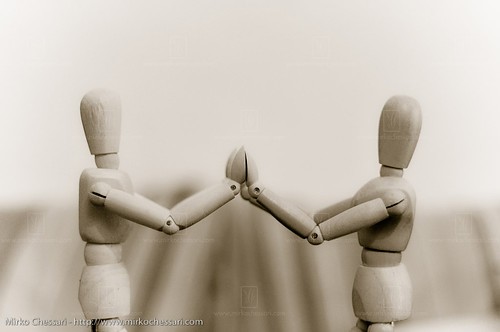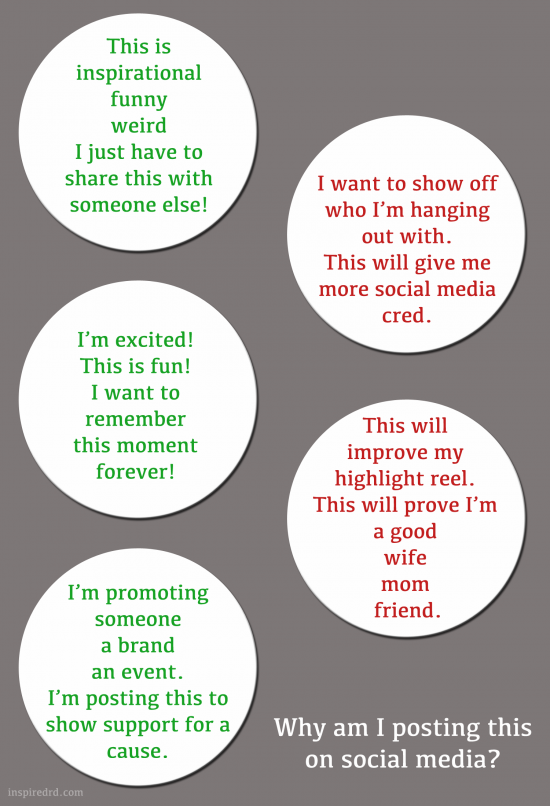Fake Facebook: Are you living a double life…by projecting yourself differently online than in real life?
This continues from where we left off yesterday when we were talking about whether all this technology chips away at the fabric of society… (Want to fight it out? Go back and comment!)
Here’s one theory-in-the-making on the table so far: The people who are alive when new technology is introduced often have the hardest time adapting to the way the latest gadgets alter society.
And here’s one way it alters life for some of us.
Being Fake on Facebook
Many of us cavemen who can remember a pre-Internet world now feel like we’re torn between two different existences.
- Our online activity in a virtual world (and)
- Our in person activity in the “real” or physical world.
But here’s where it gets even trickier.
Many of us have also crafted two different versions of ourselves to interact with these compartmentalized worlds.
There’s the us who stumbles out of bed feeling foggy and needing a breath mint. And there’s the us who tweets a pic of their manicured finger nails clutching a seasonal cup of Starbucks. Both scenes tell the story of our morning, but one is…well, let’s say kinder…in how it presents us to the masses. And guess which pic most often makes the public feeds?
The double life of physical-world-you and social-media-world-you may get even more complicated for those whose professional endeavors or hobbies require them to maintain connection with an online community of customers or fans.
If we’re championing our blog, our album, our event, our business, our cause, we come to understand–or have been flat out told by the publishers and labels–that follower numbers and page visits prove or disprove our platform. That they do or don’t demonstrate our ability to influence anyone.
And our level of influence determines a lot of things–book and record deals, the opportunities to participate in cool projects, and so on.
Thus, what we say online, how we act in the social networks, even the pictures we present…it all becomes attached in some weird artificial way to our livelihood.
I’ve heard some people compare the pressure they feel to perform in both their local community and the online one to trying to be in two places at once. (Cue the reference to any movie or sitcom you’ve seen where a guy has to rush in and out of two different places to try to make it seem as if he’s attending both events.)
Social media, for some (or at least in our worst moments), can become akin to…gulp…leading a double life.
Some even report feeling pressured to choose activities worthy of posting or tweeting about. They’re literally scheduling their day around whether or not they think certain activities would impress their followers or (gag) maintain their brand in the marketplace.
Take what Lindsey Noble has to say about being tired of social media, for example.
She begins, “I used to love all things social media. But lately I’ve forgotten why.” And then goes on to say, I think I loved how it allowed me to connect with people. But lately it seems like all we are doing is showing others the people we are connected with.
(Read the whole article here.)
And Lindsey isn’t the only saying that.
(You may remember a certain blogger named me who has defiantly dropped out of summer blogging more than once. The sunshine speaks to me.)
If you’ve been interacting online a while, you can probably remember more than a few well-known internet personalities folding up camp and declaring the whole thing a time suck. Don’t believe me? Just Google the phrase “tired of blogging” and see the blogosphere’s underbelly unfold in your search results.
Or check these factish-babies out:
- 4 in 10 women Photoshop their Facebook photos before posting them (Read about it here.)
- Women lie on social media to appear more interesting (Read about it here). And it’s probably not just women (Read about it here or over here). And kids lie too – that’s how some of them who are underage get Facebook accounts in the first place (See about that right here).
- Spending too much time on Facebook can lead us to be unhealthily comparative, feeling dissatisfied because our lives don’t seem as great as the pics and experiences posted by those in our circles (Read about it here)
- Social media use linked to narcissism. Oops. (Read about it here)
- Those who overuse Facebook and Twitter suffer withdrawl (Read about it here)
So what to do?
Well here’s one idea. Blogger Alysa Bajenaru tried to hone in on what sort of reasons are likely to prompt us to post online and then she asked herself which ones were healthy reasons.
You can see what she decided here. (She marked good kinds of posts green and unhealthy or less-than-good posts red.)
But let’s say you want to think about this more than the twenty seconds it takes to analyze this pictogram.
The deep and profound among you may want to go here to Philosophy for Change and read the post Be Human: Heidegger and Online Authenticity.
Care to fess up? Relate a little? Do you notice yourself sometimes fudging a makeshift you to the online world? And is that part of the reason so many bloggers and social media personalities eventually burn out on it? I’d love to hear what you’ve observed and what you think. (Translation: Leave a comment, please. =0).
Go to the next post in this series HERE.


